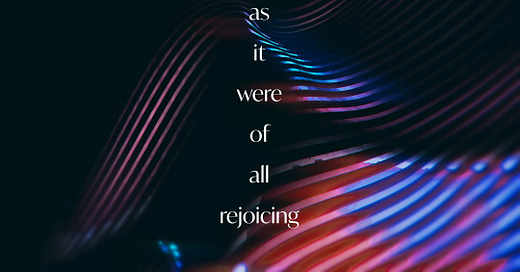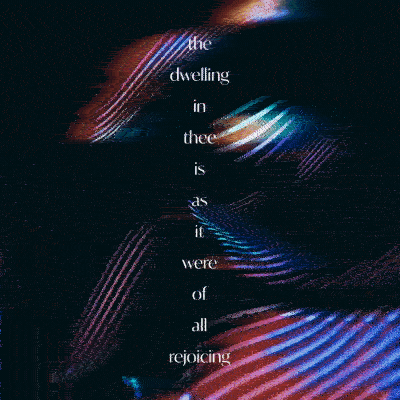The dwelling in thee is as it were of all rejoicing. (Psalm 86:7 DR)
Whenever we visit a new place, we are often asked about what we thought of it. Whether visiting a new city or a national park or traveling overseas, friends and family are usually interested in our impressions of them, for the places we visit and inhabit leave their marks on us, for good or for ill.
And just as there are areas of town that we avoid for various reasons, we also have places that we want to visit repeatedly. Perhaps they contain a favorite restaurant or have beautiful scenery or have some nostalgic connection to the past. These locations cannot help but affect us, and we are drawn to them or repulsed by them without conscious effort.
As the Psalmist concludes this Psalm in praise of the holy city, the Church, he is—as it were—giving his 50,000 foot view of all the things he has previously said about this city. All the glory of the foundations, the beauty of the walls and gates, the splendor of God’s dwelling within leads to the final conclusion that this is where all joy can be found. His descriptions in the preceding passages cannot do justice to the glory of that city, and he is left—like we all are when relating wonderful experiences—trying to express the inexpressible.
After all, to speak of it as being “of all rejoicing” is in many respects one of the most generic things one could say, for it refers not to any specific joy or feeling or delight but rather tries to contain them all. That is, the radiance of the city is so bright that looking at it is to be blinded, and all one can say is that its refulgence is as bright as the sun. Sometimes when we try to describe something that surpasses our ability to speak, we are left using terms of “feeling,” and while joy isn’t strictly speaking a feeling, we often use it for good things that we cannot describe otherwise. This city, then, defies description, for its joys are complete and words are insufficient to capture its expanse.
This inexpressible grandeur implicitly expresses that the Psalmist is speaking of a supernatural reality, for he says that the dwelling in this city “is as it were” of all rejoicing. This qualified phrase is meant to lead the mind beyond the joys of this world, for the joys of this city are “as it were” of all rejoicing, meaning that while they are true joys, they are actually joys, unlike those of this world and the pleasures and delights it affords:
Why does he say, “as it were?” Because there shall be such joy there as we know not here. Many pleasures do I behold here, and many rejoice in this world, some in one thing, others in another; but there is nothing to compare with that delight, but it shall be “as it were” being made joyful. For if I say joyfulness, men at once think of such joyfulness as men use to have in wine, in feasting, in avarice, and in the world's distinctions. For men are elated by these things, and mad with a kind of joy: but “there is no joy, says the Lord, unto the wicked.” [Isaiah 48:22] There is a sort of joyfulness which the ear of man has not heard, nor his eye seen, nor has it entered into his heart to conceive. “As it were, the dwelling of all who shall be made joyful is in You.” Let us prepare for other delights: for a kind of shadow is what we find here, not the reality: that we may not expect to enjoy such things there as here we delight in: otherwise our self-denial will be avarice. (St. Augustine, Expositions on the Psalms, 86, 8.)
St. Jerome reads this similarly:
Why did he not say, “The home of all rejoicing is within you,” rather than “as it were of all rejoicing?” Another psalm says: “When the Lord brought back the captives of Sion, we were like men dreaming,” not “we were men dreaming;” hence, this verse: “The home as it were of all rejoicing is within you.” Why have I made such a point of all this? For the reason that in the present world no matter how faithful one may be, no matter to what degree he renounces the world, his is not a perfect victory. In fact, the Gospel says: “Blessed are they who mourn, for they shall be comforted.” If, moreover, it has been said: “Blessed are you who weep now, for you shall laugh,” it is evident that in the present world there is no lasting joy; our joy is only ephemeral. “The home is within you.” Grasp what that means: no one may ever withdraw from the Church. (St. Jerome, Homily 18.)
In this vale of tears there will always be an admixture of joy and sorrow, and even the proper delights of this world that come from the good things that God has made will, in the end, fade to dust as is the lot of all the material world. As St. Augustine alluded to above, the joy that awaits those in that city is of altogether a different kind than what we currently can possess, and we must guard against even making our contempt of the things of this world into a vice, if they get turned towards the pleasures of this world themselves.
He adduces the example of someone who fasts from baser foods—which can certainly be a pious and meritorious act—but does so for the purpose of obtaining richer fare. For example, fasting from plain bread so that later one can have some chocolate cake. This type of self-denial is only apparent, for it turns self-denial into gratification and reaches only for the greater pleasures of this world rather than for the joys of that to come:
That their appetite may not be palled by ordinary dishes, they abstain till more delicate food is set before them. This fast then is for the gullet’s sake. Fasting is undoubtedly important: it fights against the belly and the palate; but sometimes it fights for them. Thus, my brethren, if you imagine that we shall find any such pleasures in that country to which the heavenly trumpet urges us on, and on that account abstain from present enjoyments, that you may receive the like more plentifully there, you imitate those I have described, who fast only for greater feasting, and abstain only for greater indulgence. Do not be like this: prepare yourselves for a certain ineffable delight: cleanse your hearts from all earthly and secular affections. We shall see something, the sight of which will make us blessed: and that alone will suffice for us. (St. Augustine, Expositions on the Psalms, 86, 8.)
The purpose of self-denial and the pursuit of virtue has to be for the sake of that which is higher and greater, for God Himself, of which the Church as the Body of Christ in her worship and sacraments and holiness is a foretaste. The life of virtue in this world, as St. Jerome states, will never be a complete victory, for in the vale of tears our joys will always be mixed with sorrow. Yet this—according to our Lord—is the state of blessedness, for those who mourn will be comforted.
The Hebrew translation of this passage departs in terminology quite markedly from the Septuagint and the Vulgate, and St. Jerome renders it as such:
Et cantores quasi in choris : omnes fontes mei in te.
And singers as if in choirs; all my fountains are in thee.
The Septuagint has the previous passage ending with diapsalma which indicates a pause of some sort, itself a rendering of the Hebrew Selah. As such, in the Septuagint, the Old Latin and St. Jerome’s Hebrew, there is an intentional break between the previous verse and this one. This pause conceptually distances this passage from the former, not necessarily thematically but rather in terms of emphasis. That is, it gives the reader or hearer space to contemplate the previous passages and then concludes, with this passage serving almost as a thematic completion or a quasi-doxology.
In this understanding, the “singers as if in choirs” is a way of describing how those within the Church here on earth join their voices—both figuratively and literally—with the heavenly chorus that praises God forever. St. John has a vision of the marriage feast of the Lamb in which all the voices of the saints join in worship and adoration:
And a voice came out from the throne, saying: Give praise to our God, all ye his servants; and you that fear him, little and great. And I heard as it were the voice of a great multitude, and as the voice of many waters, and as the voice of great thunders, saying, Alleluia: for the Lord our God the Almighty hath reigned. Let us be glad and rejoice, and give glory to him; for the marriage of the Lamb is come, and his wife hath prepared herself. And it is granted to her that she should clothe herself with fine linen, glittering and white. For the fine linen are the justifications of saints. And he said to me: Write: Blessed are they that are called to the marriage supper of the Lamb. And he saith to me: These words of God are true. (Apocalypse 19:5-9 DR)
These praises are inseparable from the bride of the Lamb—the Holy Church, the city of which the Psalmist speaks—for she contains, as it were, all the saints who are united to God in charity and who bring their adoration before Him. This is why St. Jerome noted above that to have the “dwelling in thee” entails that one cannot separate from the Church, for to be united to her is to be united to Christ, for she is His mystical Body.
It is thus that the Hebrew finalizes this Psalm by speaking of how “all my fountains are in thee.” The Psalmist has been speaking of the holy city for the entirety of this Psalm, and here locates the city as the source of these springs. This prophetically sets forth the Church as the channel of grace as she is united to our Lord as His Body. Through this mystical union she participates in that distribution of grace which flows from our Lord as the source (cf. Jeremiah 2:13). But the Psalmist also intimates the sacrament of Baptism, through which those springs well up within the individual soul:
But the water that I will give him, shall become in him a fountain of water, springing up into life everlasting. (John 4:13 DR)
This sacrament of baptism by which we are buried with Christ and raised to new life unites us to our Lord through His holy Catholic Church, and God pours the Holy Ghost into our souls (cf. Romans 5:5) so that we become, as it were, a habitation for God, a temple in which He will dwell (cf. 1 Corinthians 6:19). The fountain of grace that flows forth from the side of our crucified Lord is that which He promised would become a fountain in our own souls as we are united to Him, and His Passion and suffering and death presage the sufferings of this world as we journey towards the heavenly city, sorrowful yet hopeful in the joy that awaits:
What then? Shall we not eat? Yes: we shall eat: but that shall be our food, which will ever refresh, and never fail. “In You is t he dwelling of all who shall be, as it were, made joyful.” He has already told us how we shall be made joyful. “Blessed are they that dwell in your house: for ever and ever they will be praising You.” Let us praise the Lord as far as we are able, but with mingled lamentations: for while we praise we long for Him, and as yet have Him not. When we have, all our sorrows will be taken from us, and nothing will remain but praise, unmixed and everlasting. (St. Augustine, Expositions on the Psalms, 86, 8.)
In this final animation for this Psalm I kept it pretty abstract, using Trapcode Mir to create what I thought was an interesting ribbon pattern. I wouldn’t say I had any specific application or connection in mind to the verse, but it sort of has a mysterious and inexpressible quality to it. I also am sort of playing off the “fountains” from the Hebrew, which is why it flows a bit like water.
I added in some glows and color correction but wanted to keep it more subdued and hopefully elegant.
Enjoy.
The dwelling in thee is as it were of all rejoicing.
(Psalm 86:7 DR)
View a higher quality version of this gif here:













Share this post